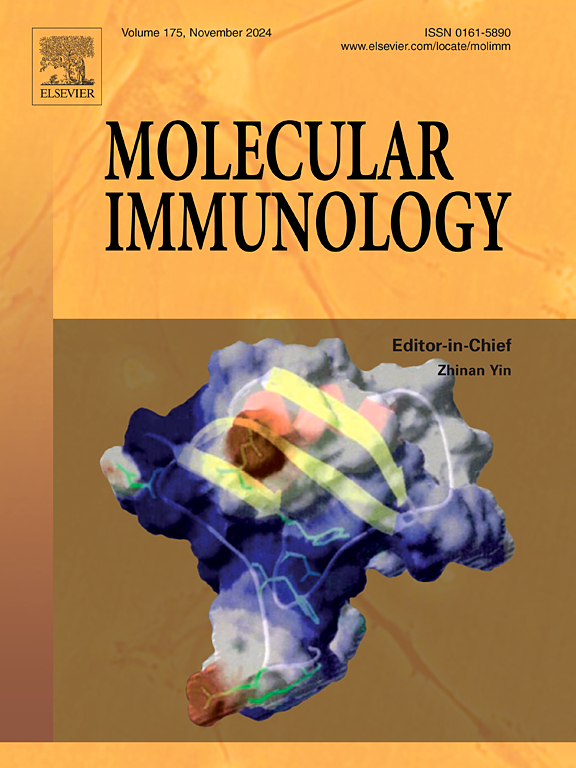Phillyrin for sepsis-related acute lung injury: A potential strategy suppressing GSK-3β
IF 3
3区 医学
Q2 BIOCHEMISTRY & MOLECULAR BIOLOGY
引用次数: 0
Abstract
The efficacy of clinical drugs for acute lung injury/acute respiratory distress syndrome (ALI/ARDS) remains suboptimal. Phillyrin (PHN), a compound derived from Forsythia, is believed to alleviate sepsis-related ALI/ARDS; however, its mechanisms are not fully elucidated. In this study, we screened 8331 target genes associated with ALI/ARDS from public databases and identified six hub genes relevant to PHN treatment: AKT1, GSK-3β, PPP2CA, PPP2CB, PPP2R1A, and AR. Receiver operating characteristic analysis and single-cell sequencing analysis revealed the expression of AKT1, GSK-3β, PPP2CA, PPP2CB, and PPP2R1A were markedly elevated. Molecular docking and dynamics simulations indicated that PHN forms a structurally stable complex with glycogen synthase kinase-3β (GSK-3β). Mendelian randomization analyses suggested that PHN, as a potent GSK-3β inhibitor, may promote M2 macrophage polarization and reduce neutrophil recruitment. We validated these findings through in vivo and in vitro experiments, demonstrating that PHN lowers iNOS levels and raises MMR levels by downregulating GSK-3β mRNA expression and protein activity during lipopolysaccharide (LPS)-induced macrophage inflammation. Additionally, PHN inhibited GSK-3β mRNA expression and protein activity, reducing NF-κB-p65 nuclear translocation in LPS-induced zebrafish inflammation and mice ALI. This inhibition decreased levels of TNF-α and IL-6, increased IL-10 levels, promoted M2 macrophage polarization, suppressed neutrophil recruitment, and ultimately ameliorated ALI/ARDS. In conclusion, our results indicate that PHN effectively alleviates LPS-induced ALI/ARDS by suppressing GSK-3β signaling.
philyrin治疗败血症相关急性肺损伤:抑制GSK-3β的潜在策略
临床药物治疗急性肺损伤/急性呼吸窘迫综合征(ALI/ARDS)的疗效仍不理想。连翘苷(PHN),一种从连翘中提取的化合物,被认为可以缓解败血症相关的ALI/ARDS;然而,其机制尚未完全阐明。在这项研究中,我们从公共数据库中筛选了8331个与ALI/ARDS相关的靶基因,鉴定出与PHN治疗相关的6个枢纽基因:AKT1、GSK-3β、PPP2CA、PPP2CB、PPP2R1A和AR。受体工作特征分析和单细胞测序分析显示,AKT1、GSK-3β、PPP2CA、PPP2CB和PPP2R1A的表达显著升高。分子对接和动力学模拟表明,PHN与糖原合成酶激酶3β (GSK-3β)形成结构稳定的复合物。孟德尔随机化分析表明,PHN作为一种有效的GSK-3β抑制剂,可能促进M2巨噬细胞极化,减少中性粒细胞募集。我们通过体内和体外实验验证了这些发现,表明在脂多糖(LPS)诱导的巨噬细胞炎症过程中,PHN通过下调GSK-3β mRNA表达和蛋白活性来降低iNOS水平并提高MMR水平。此外,PHN抑制GSK-3β mRNA表达和蛋白活性,减少lps诱导的斑马鱼炎症和小鼠ALI中NF-κB-p65核易位。这种抑制降低了TNF-α和IL-6水平,增加了IL-10水平,促进了M2巨噬细胞极化,抑制了中性粒细胞的募集,最终改善了ALI/ARDS。总之,我们的研究结果表明,PHN通过抑制GSK-3β信号传导有效地减轻了lps诱导的ALI/ARDS。
本文章由计算机程序翻译,如有差异,请以英文原文为准。
求助全文
约1分钟内获得全文
求助全文
来源期刊

Molecular immunology
医学-免疫学
CiteScore
6.90
自引率
2.80%
发文量
324
审稿时长
50 days
期刊介绍:
Molecular Immunology publishes original articles, reviews and commentaries on all areas of immunology, with a particular focus on description of cellular, biochemical or genetic mechanisms underlying immunological phenomena. Studies on all model organisms, from invertebrates to humans, are suitable. Examples include, but are not restricted to:
Infection, autoimmunity, transplantation, immunodeficiencies, inflammation and tumor immunology
Mechanisms of induction, regulation and termination of innate and adaptive immunity
Intercellular communication, cooperation and regulation
Intracellular mechanisms of immunity (endocytosis, protein trafficking, pathogen recognition, antigen presentation, etc)
Mechanisms of action of the cells and molecules of the immune system
Structural analysis
Development of the immune system
Comparative immunology and evolution of the immune system
"Omics" studies and bioinformatics
Vaccines, biotechnology and therapeutic manipulation of the immune system (therapeutic antibodies, cytokines, cellular therapies, etc)
Technical developments.
 求助内容:
求助内容: 应助结果提醒方式:
应助结果提醒方式:


